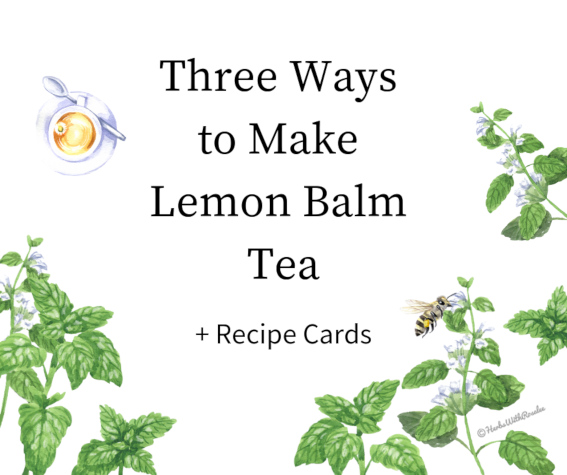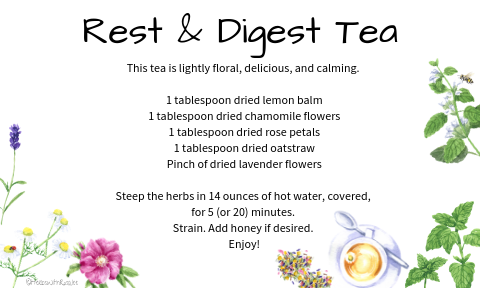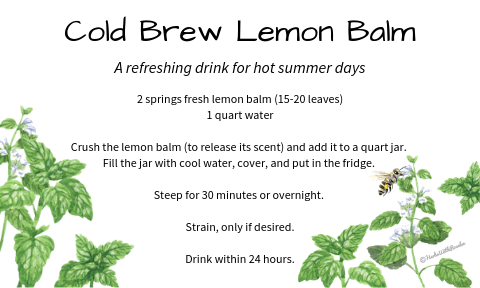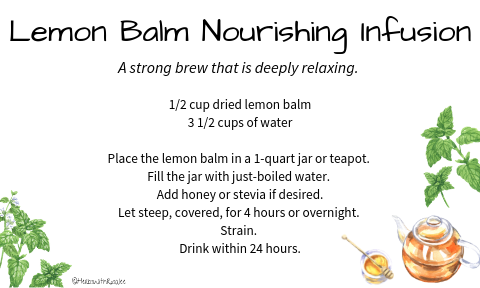Get weekly tips, recipes, and my Herbal Jumpstart e-course! Sign up for free today.

Three Ways to Make Lemon Balm Tea
Share this! |
|
Herbal teas are some of our most potent herbal medicines, and that includes lemon balm tea! I know teas aren’t always portrayed as being as sexy as tinctures (alcohol extracts) or elixirs but, in most cases, you can make a stronger tea than you can an alcohol extract!
Water is a potent extractor of many beneficial constituents, including vitamins and minerals!
But how you make tea really matters. Throwing some herbs in a cup with some hot water will only get you so far.
I used to really struggle to make good teas.
It was so bad that, whenever I handed my husband a cup of tea, he approached it like a suspicious cat. Very cautiously. Studying it. Smelling it. And then only taking the tiniest of sips before fully committing.
And it wasn’t just him.
I would try to give clients tea blends but they simply didn’t want to drink them.
Or I remember planning for a dinner party once and the host told me, “Oh you’re an herbalist, you can bring tea for everyone.” I immediately got that sick feeling in my stomach. Oh no.
I just simply didn’t know how to make good-tasting teas!
Looking back I can see the problem. My first formal herbal studies focused a lot on Chinese Medicine and so I knew how to make potent teas. I knew how to make teas “correctly” with the “right” dosage of herbs.
But making teas that were effective AND that someone actually wanted to drink…
Nope.
It took me years to learn how to make teas for every occasion.
One thing I’ve learned is that there are certain rules to making tea. These rules act as guidelines and, when you follow them strictly, you can generally make an okay or good tasting cup of tea.
But, like all rules, once you learn them, then you can learn how to break them.
So today’s rule is this:
You make a tea with aromatic herbs by infusing 1 teaspoon of dried herb into 8 oz of just-boiled water for 5 minutes.
This method of making tea is perhaps the most common one out there. In most tea books and general tea recipes this is the general directions. The resulting brew will probably taste good and, depending on the herb, have some medicinal actions.
But if we just stopped there we would be missing out on a wide array of herbal medicine benefits!
Let’s break the rules! And to make this super practical, I’ll use one of my favorite herbs as an example: Lemon balm (Melissa officinalis).
Why Lemon Balm Tea?
Lemon balm
is an amazing plant. It’s a mint, it tastes good and is easy to
prepare. You could simply enjoy it as an after-dinner tea. It promotes
digestion and can relieve gas or cramping in the gut.
But lemon balm’s virtues go beyond an after-dinner tea. It’s a powerful herb!
Lemon Balm as an antiviral:
It’s an important herb for upper respiratory infections. While acting as an antiviral, lemon balm can work as a relaxing diaphoretic to support the fever process and can calm the irritation and agitation that often accompanies a fever.
Several clinical trials have studied lemon balm’s ability to address outbreaks of herpes simplex, the virus that causes cold sores on the lips and genitals. One in-vitro study looked at the effect lemon balm may have on drug-resistant strains of herpes simplex virus and reported that the “penetration of herpes viruses into cells was inhibited by Melissa extract at 80% and 96% for drug-sensitive and drug-resistant viruses, respectively.”1
Lemon Balm Protects Against Radiation Damage
Radiation exposure from
x-rays can cause DNA damage and induce oxidative stress. Because the
damage is cumulative, this is especially problematic for people
regularly exposed to x-rays. In one study, 55 radiology staff members
were asked to drink lemon balm tea twice a day for 30 days. Oxidative
stress markers were recorded before they began drinking the tea and
again after the 30 days. Researchers recorded numerous improvements in
oxidative stress markers, including a “marked reduction in plasma DNA
damage.”2
Ultraviolet (UV) radiation is one of the leading causes
of skin cancer and photoaging (changes to the skin induced by chronic
exposure to ultraviolet/UV sunlight). One in vitro study showed many
benefits from lemon balm for protecting the skin, including a decrease
in UVB-induced oxidative stress production and a reduction in UV-induced
DNA damage.3
Making Lemon Balm Tea
How you prepare lemon balm can make all the difference in the effects that you see!
One common issue I see is that most people make a simple tea using the rule above and then are disappointed why herbs don’t seem to work!
In this article I want to show you three very different ways to make lemon balm tea AND tell you why they work with that method.
1. Rest & Digest Lemon Balm Tea Blend
The following is one of my favorite tea blends. I drink it often and it’s also my go-to when I have company over. (It’s worth noting that my husband doesn’t approach this one like a suspicious cat - he loves it too!)
The herbal tea formula blends the relaxing and soothing qualities of several herbs including lemon balm, chamomile, rose, lavender and oatstraw. Besides being simply delicious, I reach for this blend for mild digestive problems including a nervous stomach, gas, mild cramping, or nausea.
When you steep this tea for five minutes, the result is a very tasty tea. If you steep it for longer, more of the bitter qualities of the herbs come out and the tea takes on a stronger taste. It also transforms into a stronger tea.
Try it yourself! A revealing home experiment you can do is to make two cups of this tea. Steep one cup for five minutes and another cup for 20 minutes. The resulting teas won’t just taste different, they will also feel very different in your body!
Remember our tea making rule?
You make a tea with aromatic herbs by infusing 1 teaspoon of dried herb into 8 oz of just-boiled water for 5 minutes.
We’re breaking that rule by steeping the herbs for much longer than 5 minutes and we're using more than a teaspoon of herbs. In general, aromatic herbs don’t need a longer steeping time. But in lemon balm’s case, steeping it for a longer time can increase its medicinal effects.
2. Lemon Balm Cold Infusion
Many tea recipes call for using dried herbs and hot water. This makes a lot of sense because dried herbs are easier to extract than fresh ones and hot water is generally a stronger extractor than cold water.
But of course we’re all about breaking the rules today!
Lemon balm, like many aromatic herbs, can make a lovely cold-infused tea, especially when using fresh herbs.
The cool water pulls out the fresh aromatics of the lemon balm, resulting in a very different taste than a hot infusion. This tea is cooling and delicious and perfect for a hot summer’s day. I like to make this tea when I am traveling. It tastes delicious and it helps to soothe any nervous stomach jitters I might have.
This tea works because it tastes great, is very cooling for the hot summer months and it has mild calming properties.
3. Lemon Balm Nourishing Infusion
Our last tea blend with lemon balm turns our rule entirely upside down.
Instead of infusing a teaspoon of herb we’re infusing 1/2 cup of lemon balm (which, in volume measurements, is the difference between 1 gram and 20 grams).
And instead of infusing it for five minutes, or even 20, we’re infusing it for at least four hours.
The result is a very different tea altogether.
This tea is a very strong brew.
It is profoundly relaxing, perfect for when you feel super stressed and frazzled.
While our first tea blend is ideal for mild digestive upsets, this blend can be a better match for more severe symptoms such as intense cramping (also great for menstrual cramping).
This is the tea to reach for when you have a headache related to nervous tension or a fever. It is a relaxing diaphoretic, and can support the fever process when you are feeling hot, restless and anxious during a fever.
Personal and clinical experience has shown me that this strong blend can help stop a cold sore outbreak (although I recommend topical treatments as well).
This tea method works because it strongly extracts the lemon balm and uses a lot of it. The result is a very powerful tea that can be used for a wide range of health challenges.
Which is the Best Lemon Balm Tea?
I hope you’ll be able to try these three teas for yourself! You can read about what I have to say all day but, in the end, experiencing it for yourself is the best way to really get it in a way you won’t forget!
So which one of these teas is best?
None of them!
It really isn’t a matter of the ONE way to make tea, but more about using different approaches for different circumstances.
I wouldn’t want a strong lemon balm nourishing infusion when I’m out working in the garden on a hot summer’s day.
I wouldn’t want a fresh cold brewed tea in the middle of winter.
And I’d be disappointed if I tried the first tea expecting the medicinal properties of a nourishing infusion!
Instead, making teas is all about gaining the experience so you can choose the best type of tea for you, the herb and the occasion.
Click here to download all three recipe cards.
Special Considerations for Lemon Balm Tea
There is some concern that lemon balm may inhibit thyroid function, although this does remain controversial. If you have an underactive thyroid, avoid consuming this plant in excess without first speaking to an herbal practitioner.
Lemon Balm Tea Citations
1. Astani, Akram, Mojdeh Heidary Navid, and Paul Schnitzler. “Attachment and Penetration of Acyclovir-Resistant Herpes Simplex Virus Are Inhibited by Melissa Officinalis Extract.” Phytotherapy Research: PTR 28, no. 10 (October 2014): 1547–52. https://doi.org/10.1002/ptr.5166.
2. Zeraatpishe, Akbar, Shahrbano Oryan, Mohammad Hadi Bagheri, Ali Asghar Pilevarian, Ali Akbar Malekirad, Maryam Baeeri, and Mohammad Abdollahi. “Effects of Melissa Officinalis L. on Oxidative Status and DNA Damage in Subjects Exposed to Long-Term Low-Dose Ionizing Radiation.” Toxicology and Industrial Health 27, no. 3 (April 2011): 205–12. https://doi.org/10.1177/0748233710383889.
3. Pérez-Sánchez, Almudena, Enrique Barrajón-Catalán, María Herranz-López, Julián Castillo, and Vicente Micol. “Lemon Balm Extract (Melissa Officinalis, L.) Promotes Melanogenesis and Prevents UVB-Induced Oxidative Stress and DNA Damage in a Skin Cell Model.” Journal of Dermatological Science 84, no. 2 (November 2016): 169–77. https://doi.org/10.1016/j.jdermsci.2016.08.004.

Rosalee is an herbalist and author of the bestselling book Alchemy of Herbs: Transform Everyday Ingredients Into Foods & Remedies That Healand co-author of the bestselling book Wild Remedies: How to Forage Healing Foods and Craft Your Own Herbal Medicine. She's a registered herbalist with the American Herbalist Guild and has taught thousands of students through her online courses. Read about how Rosalee went from having a terminal illness to being a bestselling author in her full story here.



